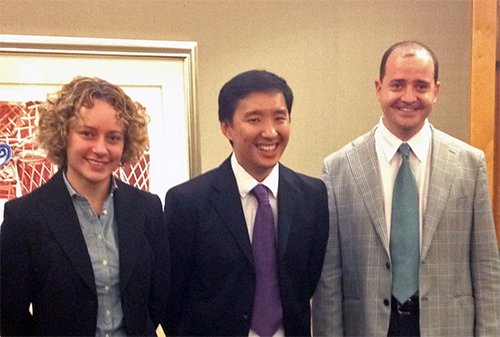Highlights
CQT team awarded S$10 million for research into randomness

CQT's proposal to study "Random Numbers from Quantum Processes" was presented to the Singapore Ministry of Education's Academic Research Council in January by three PIs from the team, Stephanie Wehner (left), Alexander Ling (centre) and Valerio Scarani (right).
For a proposal to study randomness in all its quantum forms, a team of 13 CQT Principal Investigators has won a five-year grant from Singapore's Ministry of Education (MOE) worth approximately S$10 million. The project will explore where quantum randomness will be useful, how to characterize it and what technologies to use to produce it.
Quantum physics is inherently random. In the early 20th Century, Einstein famously objected to quantum theory on the grounds of its unpredictability, arguing that "God does not play dice with the world". However, numerous experiments have since found randomness in the behaviour of quantum particles. When a measurement is performed on a quantum particle, the outcome is one of a set of values, each occurring with some probability. This randomness, long seen as a puzzle and limit on our ability to describe the world, has recently come to be valued as a resource.
Random numbers are in demand: they are used for secure identification and communication, for example to identify a customer to a bank. They are also used in the gaming industry and in scientific and engineering simulations. Unfortunately randomness generation is typically resource-intensive and hard to verify. Indeed, the science of randomness extraction occupies a large field of classical information science. On the other hand, if one masters quantum technologies, randomness comes essentially for free. Researchers have discovered that quantum properties can guarantee 'private randomness' even when devices are supplied by untrusted parties.
Led by Valerio Scarani, a CQT PI and Professor at NUS, CQT theorists, experimentalists and computer scientists collaborated on a proposal to MOE to investigate research questions around quantum randomness and develop related technologies. CQT and NUS were informed on 4 February that the proposal has been recommended for funding under the MOE Academic Research Fund Tier 3 by MOE's Academic Research Council.
Outcomes of the project could include devices with commercial potential — some companies are already marketing quantum random number generators — and fundamental advances opening new lines of research. The project is structured into three nodes focused on (i) guaranteed private randomness, (ii) simpler and faster randomness and (iii) randomness from complex quantum systems.






